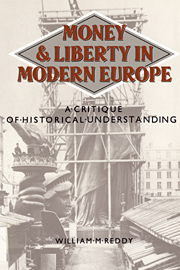Book contents
- Frontmatter
- Contents
- Preface
- 1 THE CRISIS OF THE CLASS CONCEPT IN HISTORICAL RESEARCH
- 2 MEANING AND ITS MATERIAL BASE
- 3 GROWTH OF THE LIBERAL ILLUSION
- 4 MONEY AND THE RIGHTS OF MAN IN 1789
- 5 CHALLENGING ONE'S MASTER IN THE NINETEENTH CENTURY: FROM SILESIA TO LANCASHIRE
- 6 CONCLUSION: THE POOR AND THEIR PARTISANS
- Notes
- Index
5 - CHALLENGING ONE'S MASTER IN THE NINETEENTH CENTURY: FROM SILESIA TO LANCASHIRE
Published online by Cambridge University Press: 30 September 2009
- Frontmatter
- Contents
- Preface
- 1 THE CRISIS OF THE CLASS CONCEPT IN HISTORICAL RESEARCH
- 2 MEANING AND ITS MATERIAL BASE
- 3 GROWTH OF THE LIBERAL ILLUSION
- 4 MONEY AND THE RIGHTS OF MAN IN 1789
- 5 CHALLENGING ONE'S MASTER IN THE NINETEENTH CENTURY: FROM SILESIA TO LANCASHIRE
- 6 CONCLUSION: THE POOR AND THEIR PARTISANS
- Notes
- Index
Summary
The political mobilization of the poor in the nineteenth and early twentieth centuries was one of the most significant developments in history, giving rise ultimately to both the welfare democracies and the socialist states that dominate the present world scene. But these great protest movements were not merely the birth pangs of industrial society, not merely reactions against the emergence of capitalism as normally conceived. This is because capitalism as normally conceived has never existed. The poor's social experience, out of which these protests arose, bore only a superficial resemblance to the experience that was deductively ascribed to them on the basis of the liberal illusion. As a result, their political reactions bore only a distant resemblance to the reactions that observers, whether liberal or socialist, expected them to have. As discussed in Chapters 1 and 3, a whole range of knotty problems of explanation has grown up out of attempts to account for the poor's repeated failures to live up to their supposed historic mission. But this mission was one they never espoused.
To say that capitalist society did not come into existence in the nineteenth century presents one immediately with a terminological difficulty. To call nineteenth–century society capitalist is a convention blessed by long usage and near-universal consensus; therefore the word “capitalism” could legitimately be said to mean social systems like that of the nineteenth century, whatever it was.
- Type
- Chapter
- Information
- Money and Liberty in Modern EuropeA Critique of Historical Understanding, pp. 154 - 196Publisher: Cambridge University PressPrint publication year: 1987



